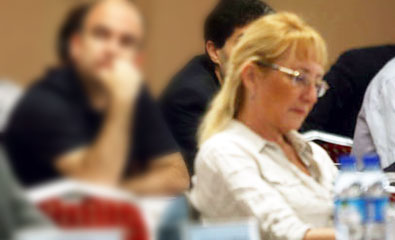Abant Meeting: Democracy Again
 The Abant Platform helps to bring to Turkey's agenda subjects such as democratization, tolerance, transparency and change in mentality. People interested in these issues, or who previously have published on these matters, come together and discuss a particular theme at each meeting.
The Abant Platform helps to bring to Turkey's agenda subjects such as democratization, tolerance, transparency and change in mentality. People interested in these issues, or who previously have published on these matters, come together and discuss a particular theme at each meeting.
This reunion's participants' profiles, lifestyles and social and political choices are often very diverse. The expectation of the reinforcement of democratic structures in Turkey is the common ground that brings all these different people together.
This year's theme was about the roles of political parties and the administrative system in Turkey's process of democratization. We've tackled the issues connected to the Sept. 12 coup and this military intervention's repercussions on today's problems. The first part of the debate was reserved to identify the past errors. As the participants are from diverse horizons, they had different diagnoses about what was most damaging for Turkey's democratization. Nevertheless, almost everyone has agreed that Turkey's military and/or civilian bureaucracy is the main obstacle for the development of democratic ideas in this country.
We can observe an actual need to implement legal reforms in order to consolidate democratic institutions and the state of law. However, even if it seems possible to modify the electoral system and the Law on Political Parties, these modifications can be rejected by the Constitutional Court. That's why the elaboration of a new and civilian constitution appears to be the most basic need. But, as the opposition parties don't seem eager to support a civilian constitution, all burdens seem to be placed on the Justice and Development Party's (AK Party) shoulders. However, because of the opposition parties' stance, the governing party is reluctant to present a draft to Parliament. As the Constitution is, per se, binding for everyone, it should also benefit from wide support, so the government is not wrong to hesitate. Some opposition parties don't want a more democratic constitution and others oppose the change just because it's the AK Party that wants to carry out the modification. Besides, the government doesn't want to push further as it can't take the risk of another closure case.
The governing party has limited room to maneuver because of the Constitutional Court's past verdicts. Additionally, the Kurdish, Alevi and non-Muslim minority issues, the Ergenekon investigation and the recent alleged military plot make things harder for the government. That's why the governing party seems to look for compromises with the "center," i.e., Turkey's classic state mechanism and currents defending the present status quo.
The Abant Platform has insisted that in order to assure democratization, the political parties should also democratize their structures and establish a new political power equilibrium. As the government feels strapped, other civilian actors must play their role. NGOs and other actors must speak out, and they shouldn't wait for the government, the Constitutional Court and the military to interact. Turkey's important transformation due to the EU negotiation process has helped people from diverse backgrounds to reaffirm similar concerns ― and every kind of criticism has become possible. The Abant meeting has demonstrated once again that democracy is not some kind of grace that one should expect from "above" and that it can only be developed when individuals and the masses ask for a more democratic environment. Looking at the participants' diversity and number and the press coverage, we can confirm that the demand for democratization in Turkey is bigger than what political parties imagine.
- Created on .